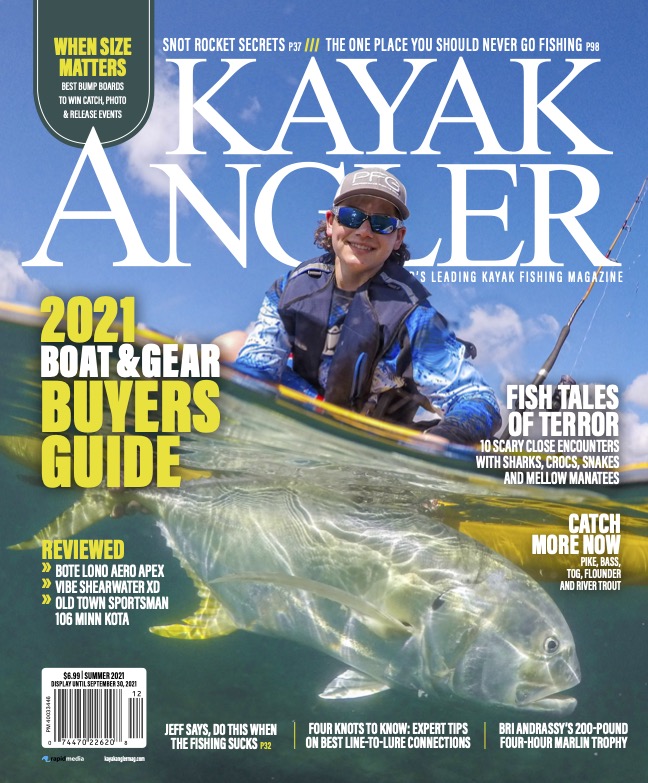Warning: The true accounts you’re about to read might scare the fishing pants off you. In reality, the odds of facing a frightening wild animal are infinitesimal, but an alligator encounter is not impossible. A bit of caution, a little common sense and some luck keep most of us out of harm’s way. These accounts are not intended to discourage anyone from kayak fishing. Instead, the following stories serve as a healthy reminder that once you paddle away from the land, you’re no longer the top of the food chain.
If alligators were as deadly as they look, there might be far fewer kayak anglers. Fortunately, unlike their larger crocodile relatives, alligators prefer to avoid people. In fact, unprovoked attacks on kayak anglers are nearly unheard of. Still, in waters where gators are abundant, anglers should never trail fish on a stringer or allow their wiener dog to swim beside the kayak. Even a tranquil alligator can only take so much enticement.
Fighting to Survive an Alligator Encounter
Being an unintended victim is exactly what happened to kayak fishing enthusiast Paul MacInnis.
On an April morning a few years ago, McInnis was happily catching and releasing small tarpon in one of the many muddy estuaries near north Florida’s Merritt Island. As he was releasing a tarpon, MacInnis lowered his leg into the water. That’s when he felt something bump on his foot.
Surprisingly, he says the bump wasn’t painful and he initially didn’t register what happened. That is, until he saw a large shadow rise from the depths, then a long row of teeth with his foot clamped in the snout. He recalls, “The gator and I looked at each other for a few seconds, then it submerged, pulling me over the side of the kayak.”

MacInnis grabbed the kayak with his left hand and managed to keep ahold of the fly rod in his right hand. With the big lizard still hanging on his foot, MacInnis managed to climb back into his kayak. He watched as the gator shook its head a couple of times, then released his foot and swam away.
Before MacInnis could breathe a sigh of relief, he looked at his foot. “I saw tendons, bones and flesh and realized the fishing trip was over.”
Passers-by Come to the Rescue
Fortunately, a father and son fishing nearby drove MacInnis to the closest ER. He was also fortunate that, somehow, even with most of his foot torn wide open, tendons and bones remained intact. Less fortunate was the excruciating pain and long recovery. The wounds leaked fluid and MacInnis changed bandages daily for months. For three weeks, he took heavy doses of antibiotics.
Despite that, several weeks after the bite, MacInnis saw a wound specialist who declared his foot in the first stages of gangrene; cultures showed that a gram-negative bacterium called Shewanella putrefaciens had established itself in the wound.

New antibiotics and 17 separate wound-cleaning appointments cleared the infection in a couple weeks. Shortly after that close call, another infection set in requiring another 10-day course of antibiotics.
Lessons Learned After an Alligator Bite
Finally, 152 days after he was bitten, MacInnes was wearing shoes on both feet and walking on his own. Today, the whole ordeal is a memory—a very disturbing memory. MacInnis actively fishes the coast and lakes. He says he doesn’t worry about gators, which is good since the large reptiles are everywhere. But, you can be sure he keeps his hands and feet inside his kayak at all times.

The name alligator is an anglicized form of the Spanish el lagarto or “the lizard.” | Feature photo: Shutterstock.com






